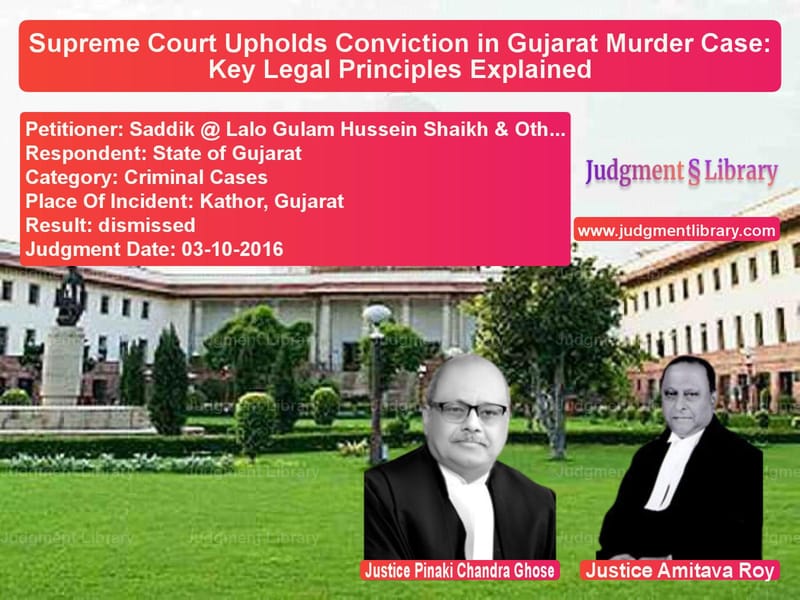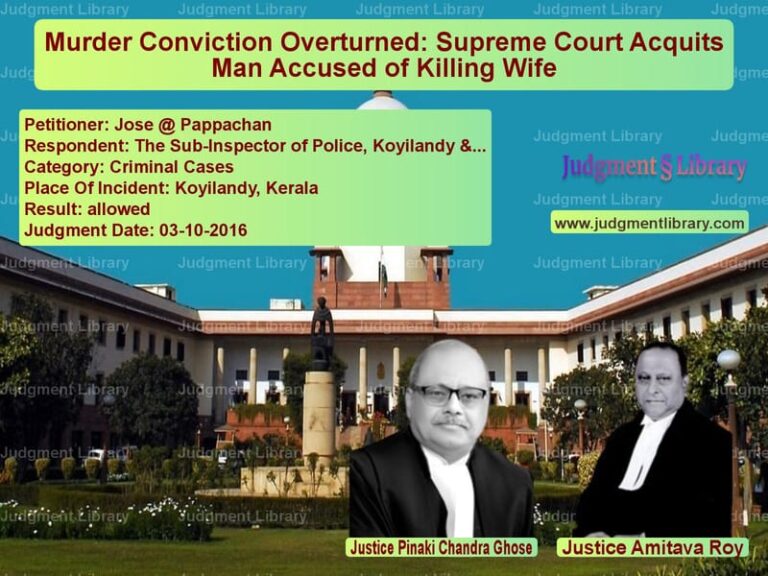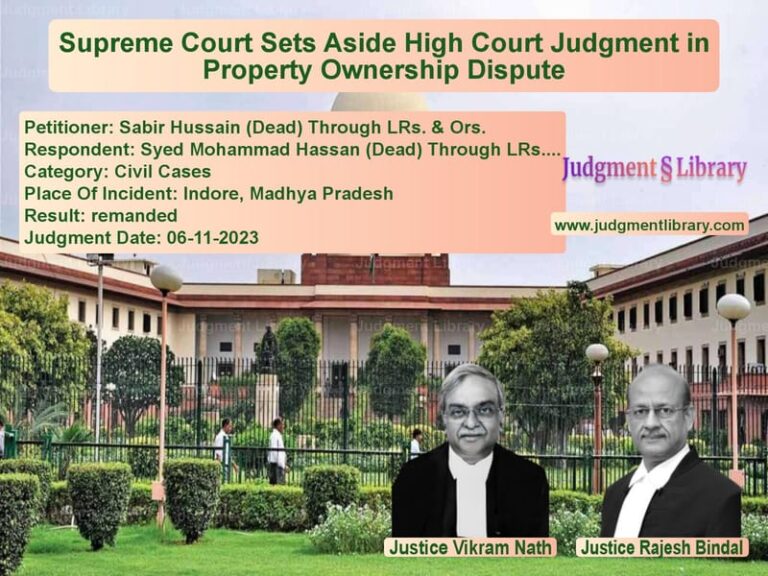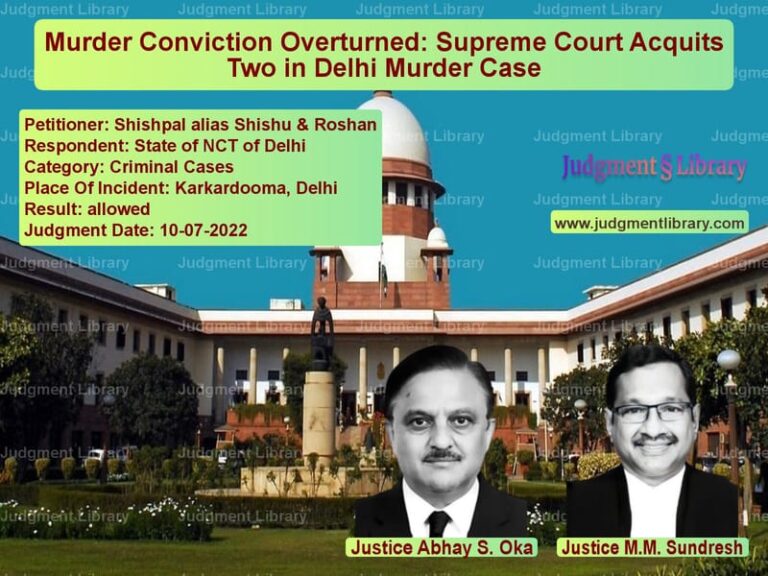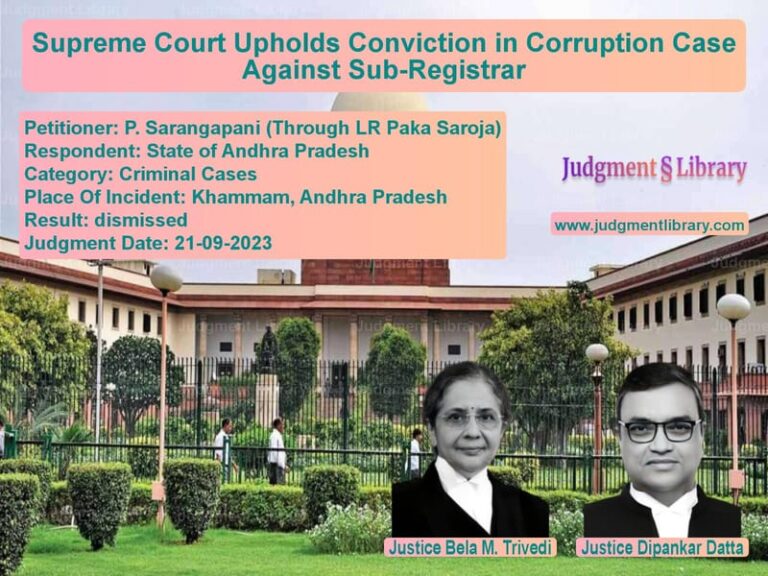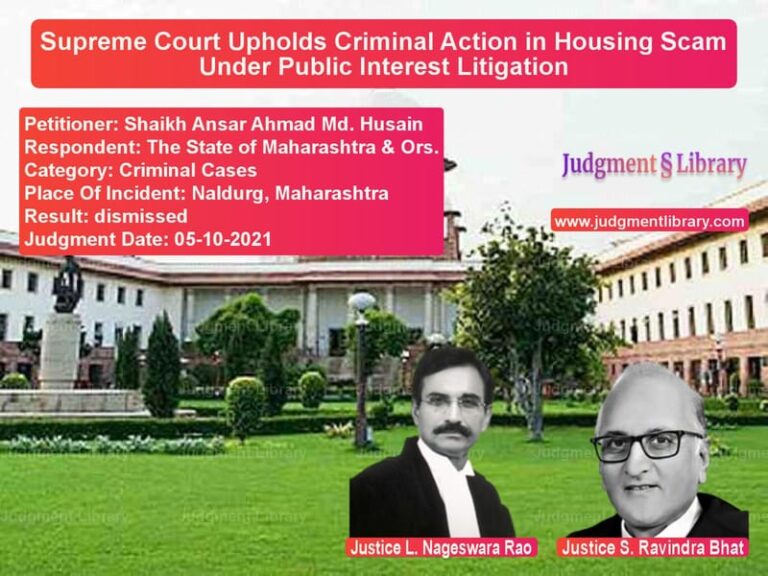Supreme Court Upholds Conviction in Gujarat Murder Case: Key Legal Principles Explained
The Supreme Court of India, in the case of Saddik @ Lalo Gulam Hussein Shaikh & Ors. v. State of Gujarat, delivered a significant judgment on October 3, 2016, affirming the conviction of the appellants for murder under Section 302 read with Sections 143, 147, 148, and 323 of the Indian Penal Code (IPC). The Court dismissed the appeals against the Gujarat High Court’s ruling, which had upheld the Trial Court’s decision convicting the accused.
The judgment reaffirmed the principles governing unlawful assembly, common object, and constructive liability under Section 149 IPC. It also addressed the applicability of Exception 4 to Section 300 IPC concerning sudden fights and heat of passion.
Background of the Case
On March 4, 2005, at around 8:00 PM, the complainant Rajubhai Jesingbhai Vasava (PW1) and three others visited a roadside eatery run by the accused, Saddik @ Lalo Gulam Hussein Shaikh, in Kathor, Gujarat. They ordered four plates of biryani but were served only three plates with chicken and one plate without it. An altercation ensued when the accused demanded payment for all four plates.
As the complainants left on their motorcycles, they narrated the incident to a relative, PW5. Meanwhile, the accused, along with accomplices, followed them in auto-rickshaws. Upon reaching a secluded area, the accused attacked the complainants with knives and sticks. The deceased, Rajubhai Ramubhai Vasava, suffered multiple stab wounds and succumbed to his injuries at Mahavir Hospital.
The police registered an FIR against the accused under Sections 143, 147, 148, 149, 302, 323, and 504 IPC, along with Sections 3(1)(10) and 3(2)(5) of the Scheduled Castes and Scheduled Tribes (Prevention of Atrocities) Act, 1989.
Arguments Presented
Petitioners’ (Accused) Arguments
- The prosecution falsely implicated the accused, exaggerating their role in the attack.
- The injuries sustained by the complainants were minor, and the accused had no intent to kill.
- Exception 4 to Section 300 IPC (sudden fight without premeditation) should be applied, reducing the conviction to culpable homicide not amounting to murder (Section 304 IPC).
- There was no common object among the accused, making their conviction under Section 149 IPC (unlawful assembly) untenable.
Respondents’ (State of Gujarat) Arguments
- The accused arrived at the scene armed with knives and sticks, indicating premeditated intent.
- The nature of the injuries, particularly the stab wounds on vital organs, showed that the accused intended to cause death.
- The accused shared a common object to attack the deceased, justifying their conviction under Section 149 IPC.
- Exception 4 to Section 300 IPC did not apply because the attack was pre-planned and not a result of a sudden altercation.
Supreme Court’s Judgment
The Supreme Court upheld the conviction, making the following key observations:
- On Common Object: The accused arrived together in auto-rickshaws, armed with weapons, and attacked in coordination, indicating a shared common object.
- On Murder Conviction: The Court held that the nature of the stab wounds and their location (chest, stomach, intestines) made it clear that the act fell under the definition of murder under Section 300 IPC.
- On Exception 4 to Section 300 IPC: The Court rejected the plea that the incident was a ‘sudden fight,’ noting that there was a significant gap between the initial altercation and the attack.
- On Application of Section 149 IPC: The accused were part of an unlawful assembly with the common object of attacking the complainants, making them all liable for murder.
The Court stated: ‘Once the case falls under Section 149 IPC, individual liability for specific overt acts is immaterial. The prosecution need not prove which specific injury was caused by which accused.’
Key Legal Precedents Cited
- Virsa Singh v. State of Punjab (1958): Established that intent to cause bodily injury that is sufficient in the ordinary course of nature to cause death constitutes murder.
- Masalti v. State of U.P. (1965): Held that when multiple persons attack with deadly weapons, common object can be inferred.
- Surinder Kumar v. Union Territory, Chandigarh (1989): Clarified that for Exception 4 to Section 300 IPC to apply, the fight must be truly sudden and unpremeditated.
- Lalji v. State of U.P. (1989): Held that an unlawful assembly’s members are jointly liable for crimes committed in furtherance of the common object.
Impact of the Judgment
The ruling has far-reaching implications for criminal law, particularly regarding group liability:
- Reinforcement of Section 149 IPC: Ensures that all members of an unlawful assembly can be held liable for acts committed by any member in furtherance of the common object.
- Clarification on Exception 4 to Section 300 IPC: Sets a high threshold for invoking the sudden fight defense.
- Strengthening Evidentiary Standards: Highlights the importance of forensic evidence and eyewitness testimonies in homicide cases.
Conclusion
The Supreme Court’s decision in Saddik @ Lalo Gulam Hussein Shaikh & Ors. v. State of Gujarat underscores the principles of common object and unlawful assembly in murder cases. By rejecting the accused’s plea under Exception 4 to Section 300 IPC, the Court reaffirmed that premeditated group violence resulting in death constitutes murder. This ruling serves as an important precedent in criminal law, ensuring accountability for collective violence.
Don’t miss out on the full details! Download the complete judgment in PDF format below and gain valuable insights instantly!
Download Judgment: Saddik @ Lalo Gulam vs State of Gujarat Supreme Court of India Judgment Dated 03-10-2016.pdf
Direct Downlaod Judgment: Direct downlaod this Judgment
See all petitions in Murder Cases
See all petitions in Attempt to Murder Cases
See all petitions in SC/ST Act Case
See all petitions in Judgment by Pinaki Chandra Ghose
See all petitions in Judgment by Amitava Roy
See all petitions in dismissed
See all petitions in supreme court of India judgments October 2016
See all petitions in 2016 judgments
See all posts in Criminal Cases Category
See all allowed petitions in Criminal Cases Category
See all Dismissed petitions in Criminal Cases Category
See all partially allowed petitions in Criminal Cases Category

